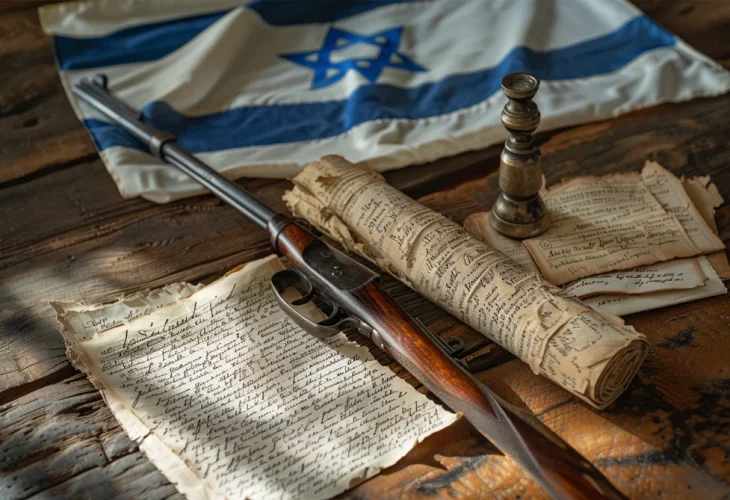Memorial Day
Faith Under Fire: The Halachic Struggles of Gush Etzion
In the face of siege and destruction, Gush Etzion’s pioneers wrestled with halachic questions that revealed their unshakable faith

On the 5th of Iyar 5708 (May 14, 1948), David Ben-Gurion stood in Tel Aviv and declared the establishment of the State of Israel. Reporters and photographers filled Dizengoff House on Rothschild Boulevard, documenting the birth of a new nation.
Meanwhile, about 70 kilometers southeast, the residents of the religious kibbutzim in Gush Etzion were enduring a completely different reality. Three hundred and twenty Jews, bound together, were being marched into Jordanian captivity. Exhausted, hungry, and humiliated, they were taken to the Mempara camp near the Iraqi border. For Tel Aviv, that Friday evening marked the first Shabbat of an independent Jewish state. For Gush Etzion, it marked their first Shabbat as prisoners.
That same Shabbat morning, while Jerusalem echoed with celebration, a mob of Arab rioters descended on Kfar Etzion, burning homes, synagogues, and public buildings. The day before, the Jordanian army had destroyed the settlement’s main building, killing 127 Jews. Yitzhak Rabin, spending that Shabbat in Ma’ale HaHamisha, recorded in his diary the smoke rising from Gush Etzion even as shouts of joy rang out from Jerusalem.
The young Israel Defense Forces lacked the resources to protect all the country’s Jewish settlements. Many early victories were seen as open miracles. Gush Etzion fell, but the State of Israel was born.
Yet Gush Etzion’s story isn’t only one of military heroism or tragedy. It’s a deeply spiritual story, one of unshakable faith and commitment to halacha even in the most extreme conditions. Recently discovered letters reveal the profound halachic dilemmas that accompanied the settlers during the siege, from the early days until the very end.
The roots of Gush Etzion trace back to 1927, when Jews from Mea She’arim, led by Yaakov Rosenblum, bought land on a high hill they named Migdal Eder. Despite the harsh conditions like deep snow in the first year, they remained determined. But in the 1929 Arab riots, the community was destroyed. In 1934, it was rebuilt, only to be evacuated again during the 1936 riots.
Finally, in Nissan 1943, as the Warsaw Ghetto Uprising raged in Europe, Kfar Etzion was reestablished by young, idealistic members of religious youth movements. Others soon joined. In Sivan 5707 (1947), the settlers celebrated the mitzvah of Neta Revai, dedicating fruit from the land with joy and song.
But the joy didn’t last long. That year, the Arab siege began, harsh, prolonged, and deadly. The Lamed Hei convoy, sent to bring supplies, was tragically ambushed. Inside Gush Etzion, the residents faced more than physical danger, they faced spiritual and ethical challenges that would test anyone’s faith.
Among the letters found in the archives were halachic questions that reflect the community’s depth: Could they train with weapons on Shabbat, even when there was no immediate danger? The rabbis eventually permitted Shabbat training out of necessity, but required that Shabbat be honored in other ways, no writing, no delivering letters.
One secular resident wrote bitterly to his wife, lamenting that he was being forced to wait to open her letter until after Shabbat. “I miss you,” he wrote, “and know nothing of your wellbeing. Still, they stop me from reading your letter the moment it arrives...”
Yet Chief Rabbi Herzog ruled otherwise: a letter from home could uplift a weary soul and give strength to continue defending Jewish life. He permitted opening such letters on Shabbat, understanding the power of a loving word in a time of despair.
Other dilemmas arose. The kibbutz had cattle and a trained shochet (ritual slaughterer) but no menaker, the one who removes forbidden fats and the sciatic nerve to make the meat kosher. Roads were blocked, but there was a small airstrip. Could they fly one in? They pleaded in a letter: “I can't comprehend why the entire Jewish state can’t send one menaker to help make this meat kosher! People are fainting from hunger... yet the meat may spoil!”
In one especially powerful case, a large bull was wounded by gunfire. Its meat could save lives but was it still kosher? No reply came from the rabbinic authorities in Jerusalem, who were overwhelmed with war. So Rabbi Tzvi Tilman, a local resident, turned to the halachic texts himself. After careful study, he ruled the animal was still kosher if they could slaughter it properly.
But there was no kosher slaughtering knife. So one of the kibbutz members spent the entire night in the metal shop, carefully crafting a halachically acceptable blade. By morning, the bull was miraculously still alive. It was slaughtered with the new knife, and the starving residents finally had kosher meat.
These chilling and inspiring halachic struggles show a community that never gave up, not on life, and not on halacha. In the midst of war, loss, and hunger, they clung to Torah, to emunah (faith), and to the wisdom of the sages.

